- Home
- Lionel Shriver
Big Brother Page 32
Big Brother Read online
Page 32
One foot on the piano bench, Edison was tipping a chair back beside our new dining table, on which only the cake remained. His right hand was gucked with icing and clinging crumbs to the third knuckle, and he’d smeared butter-cream fudge onto the sleeve of the leather trench coat. The cream shirt with its tracery of musical scores was marred down the front with chocolate stains. He wore an airy, bemused expression, and had timed his next claw into the cake with my exit from the kitchen.
Perhaps owing to the nature of the occasion, our guests had cut sparing pieces, and two-thirds of the monster was leftover. Or had been leftover, since I could discern the original blade-sharp borders, into which a rough gouge crudely intruded. The missing chunk itself the size normally baked for birthdays, the cake looked mauled.
“Whaddya think, Feltch? Think I can finish it?” My brother grinned; his teeth were blacked in the interstices with chocolate, which made them look decayed. The smears around his mouth were brown, not red of course, but still reminded me of a coyote’s bloodied snout when stuck into cow. Edison swigged from the bottle of whiskey and wiped a dribble with his sleeve.
“Stop it,” I said.
“Seems to me I don’t take orders from you no more,” said Edison, his voice slurred from icing or scotch or a great deal of both. “Ain’t your year of indentured servitude officially finito? ’Sides. I earned a little indulgence, didn’t I?” He reached to pull the string of his present from my employees, now flopped beside the platter as if having binged itself unconscious, and the doll spouted, “I lived on four envelopes of powder per day for six months. Beat that, motherfucker.”
“That doesn’t look like a little indulgence. Now, cut it out. It’s not going to work. Not this time. Cody? Tanner? Are you ready to go?” I put on my coat.
“Where are you going?” said Edison. “When you’re already home?”
“I’m going home-home.” I took Fletcher’s hand.
“This just a sleepover, or a desertion?”
Fletcher said, “Look, your sister just gave you a solid year of her life—”
“And now the bell’s rung. Time! I get it.” Edison picked an M&M off the icing, now garnished with cigarette ash.
“This is blackmail,” I said, and nodded at the kids. “Come on.”
Cody hung back. “Maybe Edison needs company right now.”
“Company is exactly what your uncle doesn’t need, sweetie. Believe me.”
Removing my brother’s real family entire at a stroke, Fletcher and I walked out with the kids trailing, as Cody shot her uncle the kind of backward glance that in the Bible would have turned her to salt.
III: Out
a complicated falling sensation
I didn’t abandon my brother, but I found our visits painful, and spaced them widely to spare myself. The rapidity with which he gained back every pound seemed biologically unfeasible, and Edison grew impatient with my proclivity for bursting into tears. He assumed a droll blitheness during the proceeding months, an infuriating whimsy. He relished afflicting his sister, for whom he would stage theatrical binges on whole cherry pies or gallons of Rocky Road. For that airiness he’d assumed while mauling the Chocolate Dump Cake did not abate, and he soon acted as if our onerous endeavor at Prague Porches had simply been a lark, at which he now looked back with a wheezy hee-hee-hee. Cody was more faithful about stopping by an apartment whose rent, for reasons opaque to me, I was still paying. Her nature is forgiving, though even my stepdaughter returned from these missions disconsolate. In an apartment that could increasingly be described as a rat hole, he was growing into a shut-in, having given up the bike but no longer enjoying access to my car. I never saw him in that leather trench coat again. After a couple of months, it would no longer have fit.
I did read him the riot act more than once before the situation got too far out of hand, but he was impervious to my displeasure, on which if anything he feasted. As the months wore on and his dimensions continued to swell, we went back to the say-no-evil policy of his arrival in New Holland, when any mention of the elephant in the room had seemed impolite.
About two years into Edison’s backslide, I did make one last-ditch effort to get my brother to feel invested in himself again. Through Slack Muncie I tracked down the ex-wife Sigrid, who reluctantly put me in touch with her son Carson, now nineteen and playing the trumpet at the same Brooklyn dives in which Edison had performed before decamping to Iowa. As I expected, Carson was curious about his dad, and accepted the ticket to Cedar Rapids that I offered him over the phone.
I wasn’t about to mug my brother at his door with his long-lost son, so we asked this lovely young man to stay at our house. I lured Edison from his lair, arranging to meet at the outside tables of an upper-level restaurant in Westdale Mall, whose armless chairs wouldn’t present too tight a squeeze. My nephew and I arrived a few minutes early, and I spotted Edison rising from the escalator. He shambled toward our table, but the moment he recognized the boy—perhaps he’d followed his son’s budding musical career online—he froze. His face turned red as a stoplight. With more alacrity than you’d think a man that size could marshal, he turned heel. Carson followed my gaze, and must have glimpsed the back of a big man in yard-wide jeans. Called to a loyalty still more primal than the one I owed this near-stranger nephew, I said nothing. We waited forty-five more minutes, nursing Cokes, until I said I guess he isn’t coming, I’m sorry. Carson was disappointed. And my, did I get it in the neck from Edison the next day. “Do I want my son to see me like this, man? What were you thinking?” Somewhere in there still lurked the old sense of pride.
Which is why I was relieved when Travis died immediately thereafter: thank God I had thought to email our father the photograph I snapped of Edison on the cusp of his Coming of Size party. Eager, luminous, and lean, that image would have been the last portrait of his firstborn with which Travis had been left, making a death that hit Edison unexpectedly hard a trace easier to accept. In single moments we appear our deep, true selves, and I was lucky to have captured then, as I’d told Tanner that night, “essence of Edison,” which I’ve had framed and continue to contemplate, always with a complicated falling sensation, on the wall of my study.
Whether my product became passé or was the victim of a vertiginous economic downturn wasn’t clear, but orders at Baby Monotonous did indeed dry up, and this was one project whose reversal left me dry-eyed. I was sorry to let my employees go, but if I hadn’t closed up shop promptly I’d have lost my family’s savings. Besides, the company had been founded on a good joke that had worn thin. Our pull-string dolls had too often evidenced a mean streak that didn’t suit me, and when I sold off the sewing machines and shut the warehouse for good I felt lighter and cleaner.
At least I didn’t have to fire Edison, who never returned to work after that party. Instead, after he’d eaten through his savings, he got a job . . .
No, I said he’d become “a virtual shut-in,” didn’t I? So maybe he started working from home doing . . .
Or strike that. He was able to live off the windfall from . . .
No, an inheritance would be risible. Travis contrived to leave this earth as we all should: house refinanced, credit cards maxed.
Come to think of it, why on earth would Edison stay in Iowa? Why would any New York jazz musician have moved to Iowa in the first place? How would a chronically self-deceiving hedonist like my brother ever lose 225 pounds in a single year?
coming clean
I’m sorry, but I can’t keep this up. It’s all a lie. Or nearly.
This much is true: Tanner did in fact go through a protracted and largely awful informal internship with his step-grandfather. He did come back to Iowa and finish high school, though after graduation he followed up on an old contact from Edison, and he’s now a runner for HBO. I really have learned not to be “pre-disappointed” for my children, no matter how seemingly unattainable their hopes, and that rea
lly is advice I got from Edison somewhere along the line. I have folded Baby Monotonous—though I now miss the very solicitations to do this and that interview that I’d come to find so irksome; that is, I miss finding them irksome. (Maybe it’s more satisfying to fend off the world’s attentions and howl at the heavens that you long to be left in peace than to be left in peace. Which is to say: you can’t win.) Travis really did suffer a fatal stroke. But in truth, Cody is still painfully shy, and would never be coaxed into playing the piano for a whole party of adults. Under her uncle’s brief tutelage she did learn to improvise a little, but in short order she ceased altogether to stray from the notes on the page.
The rest is a story I tell myself, and not a convincing one. Maybe my imagination finally failed in that flailing of ellipses because for my hip, downtown brother to have buried himself anonymously in the middle of the country is fanciful, especially after he’d already buried himself in himself, hiding between the perimeters of his own enormity as I have hidden between coasts. He was never a disciplined man, and chances are that a prolonged crash diet with little envelopes would have proved beyond him. For me to suppose that he might have made such a sacrifice if only to please me is to exaggerate my importance to him and to grossly inflate my influence (always tiny). In other words, I flatter myself. As for that character transformation I celebrated, maybe it was just a device for explaining what about my brother bugged me, what I would have changed if I could have, which I couldn’t. All that girlhood admiration was genuine enough, but admiration keeps its object at bay. When you look up to someone, you turn a blind eye to more complex or disheartening information that takes him down a peg but also turns him into a real person. In consequence, I never knew my brother very well. I remained in awe of the man from a distance. Close up, he was often trying, and I preferred his company in small doses.
Rest assured that, right up until my wistful visit to our guestroom on Solomon Drive while Edison was packing, this tale is earnestly recounted. Bloated literally beyond recognition, my brother did visit my family for two very long months, although I never urged him onto any industrial-grade scale, and his then weighing “386” is merely a wild guess. He and Fletcher did not get along. That night before his flight back to LaGuardia, I was indeed seized by an impulse to propose something rash—perhaps a sequestering of just us two, so that I could coach him to lose weight and come to some better understanding of why he’d gained it in the first place. Yet I bit my tongue. I knew Fletcher would find the idea absurd, and wouldn’t take kindly to a desertion. My marriage was just young enough that I didn’t want to test it, and I told myself as well that I had adopted two children, who had to come first. The truth was less noble: Live still longer and even more intensively with my difficult brother, assume the rank of four-star general in the Confectioner’s Sugar Wars? I just didn’t want to.
So rather than unfurl my grand accord and offer to rent us our own apartment, I wandered downstairs and checked the laundry, discovering that pair of jeans that I pretended we used on our snowman and later deployed as tongue-in-cheek décor at an apocryphal “Coming of Size” party. I brought them upstairs so Edison could pack them, dreading the prospect of coming upon this flag of his metamorphosis once he was gone. I drove him to the airport the following afternoon, in plenty of time to catch his plane. On my return home, the empty, broken-down maroon recliner at the head of the table was so upsetting that I had Fletcher cart it to the dump with his pickup the very next day.
After that, I kept in sporadic touch with Edison through email and telephone. Since neither medium forced me to confront the spectacle he had become, this communication required little. I bought him health insurance, which was frankly in my interest. I sent him money from time to time. I wish I’d sent more.
In the months proceeding Edison’s departure I did make a soldierly effort at losing some weight myself, since that nonsense about my having dropped fifty-four pounds in sibling solidarity was just as outlandish as Edison’s equally fictitious deflation. I did eventually starve off about fifteen “big ones,” not through any all-liquid diet but the conventional stinting portions. It was a tedious period for the whole household, and the results left me indifferent. Experiencing the same mutinous reaction to my mortification of the flesh as I had to his own puritanism, at last Fletcher grew less militant about food. With the miraculous resurrection of manicotti, Cody and even Tanner on his return from L.A. made fewer excuses to skip the family meal.
Nowadays, we’re all bored to death with fretting over what one should and shouldn’t eat, and through the arbitrary choices of largely apathetic diners we’ve maintained a varied and not especially terrible diet. Granted, when Cody came home last Christmas after her first semester at Reed our beanpole had grown stocky, but that’s common at an age of late-night brownie-bonding, and I haven’t said anything. I’ve regained a handful of that lost poundage myself, and I don’t care. I remain a solid twenty pounds overweight, and plan to stay that way. I gladly trade a svelte figure for the capacity to think about something else. If I am not the most attractive woman in this part of Iowa, I am also not a pill.
After Edison’s marathon visit to New Holland, I next saw my brother in L.A. for Travis’s memorial two years later. I’d sent him a business-class ticket, in the hopes that a more luxurious seat and flight attendants who would feign being nice to him would make up for the fact that by then he found flying logistically treacherous. Fletcher, Cody, and I flew ahead and met him at the airport in a capacious limo. We were elaborately patient with the slowness of his gait, and all went to a great deal of trouble to ensure that he did not feel he was any trouble. He didn’t exasperate me anymore, not even Fletcher. Instead he inspired a crippling tenderness. He’d gotten bigger, you see. By then suffering from emphysema, he pulled an oxygen tank behind him everywhere he went like a dog, and only removed the air hose from his nose to light another cigarette.
We all met Solstice for dinner that night, and she was such a mess that I had to ask our waiter for extra napkins so she could blow her nose. Edison and I had always imagined that Solstice grew up in a different family, having missed out on Travis’s heyday as a TV star, but with two siblings who’d shunned her in order to feel closer to one another and a mother who died when she was three, she’d pretty much grown up with no family. When she wouldn’t hear a word against our father, I discovered what a gaping hole the man left behind: without Travis to hack on, Edison and I had shockingly little to talk about.
We held the reception in our father’s favorite Mexican restaurant, which rented its back room for private parties. Tanner took time out from hustling for an entry-level job in television to pay his respects; after all, Rosita’s was a twenty-minute drive from his grungy apartment share. Even the surviving cast of Joint Custody made an appearance. Edison’s and my ridicule of these icons-cum-nemeses had been more fun behind their backs. The actors we’d despised had been children, and there was nothing to be gained from mocking middle-aged has-beens whom we barely recognized. A testimony to the success of antiretrovirals, Sinclair Vanpelt still had a hand in television, and was talking up a pilot that didn’t sound promising: a gay take on The Odd Couple, when the original series had been about a virtual-gay relationship already. Sinclair emblemized that sort who receives just enough B-list recognition to keep bashing his head against the wall. Then mobilizing what would prove an unsuccessful bid for the Senate, Floy Newport was predictably warm; having been a child actor had foreshortened into a quaint curiosity of her bio. Refurbished by Narcotics Anonymous, Tiffany Kite had become a fundraiser for battered-women’s shelters. I wondered if personal experience had attracted her to the cause, or whether she simply wanted people to make that assumption, the better to play the drama queen.
Maybe this phenomenon was more noticeable in California: while milling under the bright piñatas that dangled from the ceiling, I was struck by how people who hadn’t seen each other in years were literally sizing ea
ch other up, this mental weigh-in a ridiculous shorthand estimation of how we were faring in other spheres. Sinclair looked drawn and scrawny, but the slimming effect of AIDS didn’t inspire much envy. Like me, Floy had put on just enough padding to make her seem down-to-earth, which may have been to her electoral advantage. Tiffany was skeletal, and exuded that prim, neurotic brittleness that drove me to a second quesadilla. Naturally, Edison dwarfed anyone else’s thriving gut into a throw pillow. In the mourners’ defense, the jalapeño-spiked air of Rosita’s back room went thick with compassion. Travis’s friends and former associates all made a point of talking to Edison, though they appeared to have a dreadful time looking him in the eye.
Impelled to shield Edison from their pity, Cody and I were solicitous, finding him a suitable chair when he got tired, or grabbing him an extra crab burrito from a passing platter. I acted as interlocutor with strangers, explaining that we were Travis’s children, my introductions of my brother the widely recorded New York jazz pianist defiantly unapologetic. Whether from the stress of the previous couple of years or our father’s death, he was subdued. I missed his bluster. I wanted to hear about the tours and the CDs and the gigs and the high-flying colleagues, even if he had to make them up.
Nevertheless, in my alternative-reality fairy tale, why did I conclude with a fall from grace initiated by that Chocolate Dump Cake (a real recipe that I tried once, found too heavy and sickly sweet, and never baked again), rather than fashion a proper happily-ever-after ending? You know, newly lithe brother lives on 2 percent milk forever more, runs marathons, falls in love, maybe even sires a couple of children who aren’t borrowed from his sister, continues to play the piano as an avid amateur while contentedly pursuing a modest calling to pay the bills—he could be a seed salesman, why not?—and joins numerous civic organizations in his adoptive state . . .

 Ordinary Decent Criminals
Ordinary Decent Criminals The Female of the Species
The Female of the Species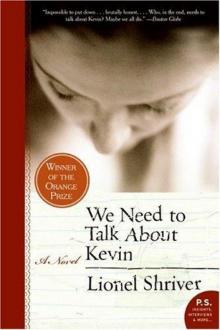 We Need to Talk About Kevin
We Need to Talk About Kevin A Perfectly Good Family
A Perfectly Good Family So Much for That
So Much for That Checker and the Derailleurs
Checker and the Derailleurs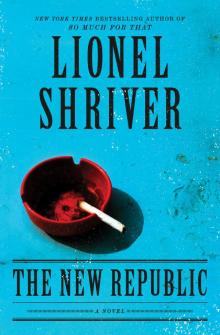 The New Republic
The New Republic Double Fault
Double Fault Should We Stay or Should We Go
Should We Stay or Should We Go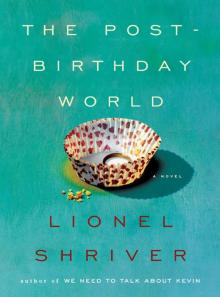 The Post-Birthday World
The Post-Birthday World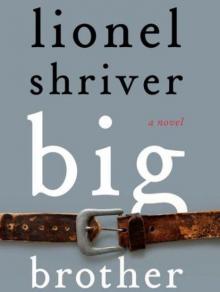 Big Brother
Big Brother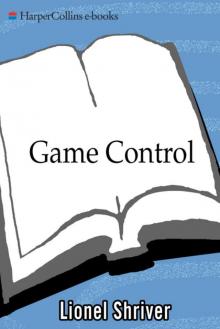 Game Control
Game Control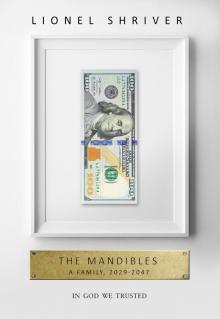 The Mandibles
The Mandibles The Standing Chandelier
The Standing Chandelier Property
Property So Much for That: A Novel
So Much for That: A Novel